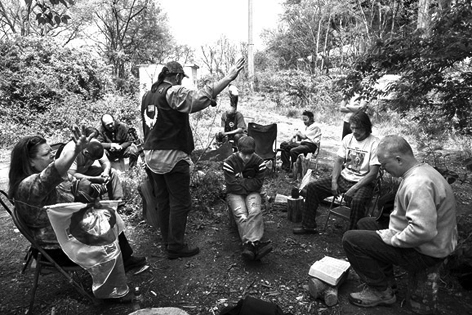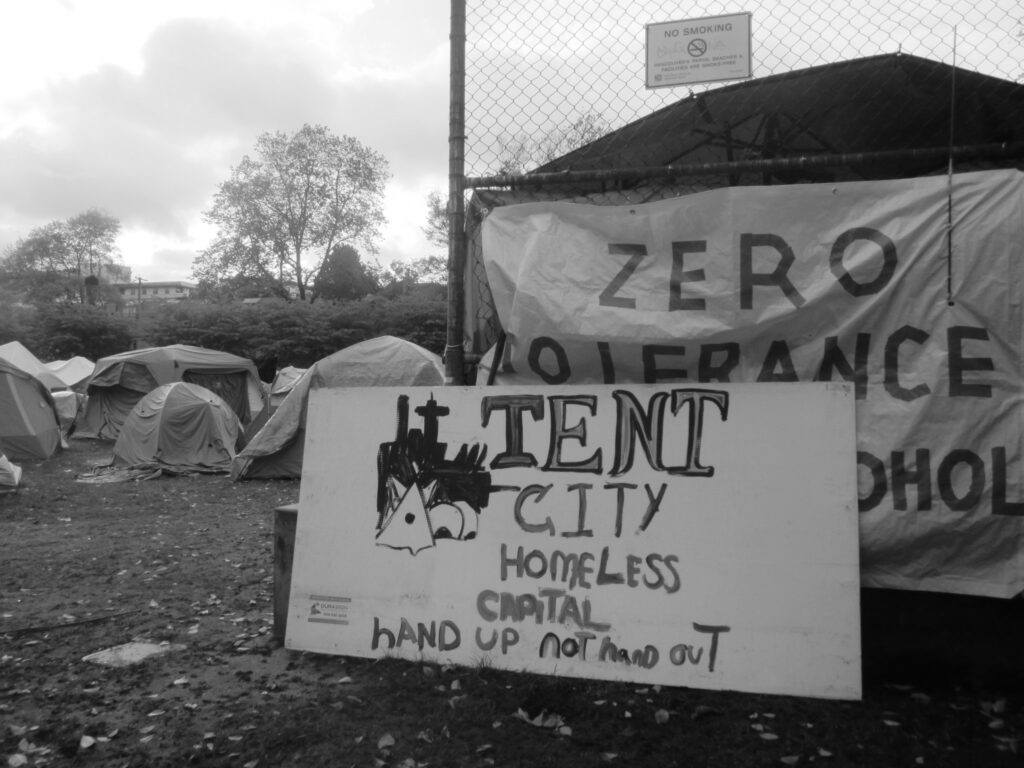
This Bible study is the fourth in a series developed to foster conversations about the biblical and theological significance of the New Poor People’s Campaign. It is available for download in PDF form here.

The Collection was money raised by Jesus communities throughout the Roman Empire and sent to the poor leaders of the new Jesus movement based in Jerusalem, “the Lord’s people.” It was a way to care for one another and build community across lines of ethnic division, a way to help each other survive under conditions of severe poverty and a way to fund the building of the early Christian movement. Paul talks about the collection for the poor in almost all of his major letters, so this is something that is very important to Paul’s mission and theology. Today much of the fuller purpose of this project is lost in translation, particularly its subversion of the Roman Empire and the genius of the poor making ways out of no way. Instead we most often use Paul’s writings about the project to encourage tithing to church institutions. This study pairs one of those biblical texts with sections of three reflections on how we care for one another and how meeting each other’s needs makes it possible to organize for a society where all needs are met.
It is recommended that you read the texts aloud together (20–25 minutes), share initial responses (10–20 minutes), and then answer the discussion questions (20–40 minutes). If you have less than an hour, you might ask participants to read the texts in advance. As you read the 2 Corinthians text, note that the underlined words are all translations of the same root, charis, a Greek word most often translated as “grace” in English versions of the Bible.
Discussion questions
- What ideas and social principals do you most often associate with the apostle Paul? Is it surprising that the collection for the poor is a subject he discussed more than almost any other?
- If you are familiar with Paul’s Collection, how have you most often heard it interpreted and applied to contemporary life?
- What is the significance of the Macedonians’ generosity in the midst of “extreme poverty”?
- How is charis (grace) being used? How does this usage impact your understanding of grace?
- Tent City families were part of a multiracial organization of, by and for poor people dedicated to building a movement to end poverty. In what ways would Tent City help them in that work?
- In what ways were the families of Tent City practicing the Collection, and how do they help us understand Paul’s Collection?
- Where do you see the spirit and practice of the Collection today? How might these types of practices contribute to building a new Poor Peoples’ Campaign?
2 Corinthians 8:1-7, 13-15 (NIV)
1 And now, brothers and sisters, we want you to know about the grace that God has given the Macedonian churches. 2 In the midst of a very severe trial, their overflowing joy and their extreme poverty welled up in rich generosity. 3 For I testify that they gave as much as they were able, and even beyond their ability. Entirely on their own, 4 they urgently pleaded with us for the privilege of sharing (koinonia) in this service (diakonia) to the Lord’s people. 5 And they exceeded our expectations: They gave themselves first of all to the Lord, and then by the will of God also to us. 6 So we urged Titus, just as he had earlier made a beginning, to bring also to completion this act of grace on your part. 7 But since you excel in everything — in faith, in speech, in knowledge, in complete earnestness and in the love we have kindled in you — see that you also excel in this grace of giving. …
13 Our desire is not that others might be relieved while you are hard pressed, but that there might be equality. 14 At the present time your plenty will supply what they need, so that in turn their plenty will supply what you need. The goal is equality, 15 as it is written: “The one who gathered much did not have too much, and the one who gathered little did not have too little.”((A citation of Exodus 16:18, “And when they measured it by the omer, the one who gathered much did not have too much, and the one who gathered little did not have too little. Everyone had gathered just as much as they needed.”))
Rev. Dr. Liz Theoharis, “Ending Poverty Is Possible” – First Presbyterian Church, New Canaan, CT, January 4, 2009
“I witnessed a miraculous feeding in Philadelphia at Tent City. Tent City was an encampment where over 40 homeless families lived in tents and cardboard boxes during one of Philadelphia’s hottest summers. That summer the city’s shelters were full and mothers with babies were being told to sleep on the street.
“Tent City was set up by the Kensington Welfare Rights Union (KWRU), a multi-racial group of poor and homeless families. There homeless families of different races lived together — sharing donated toys, clothing, food and toiletries. Just like Deuteronomy 15 reads, there was no needy person at Tent City. When a family was evicted and moved to Tent City, they would present their food stamps to the community. When someone needed to go to an appointment, families would volunteer to do childcare and pool their money to pay for the bus for that person. When it was hot, people in the surrounding community would drop off water and juice and all kinds of food.
“Governmental and religious institutions were skeptical. They said (and continue to say) that there is not enough to go around. They told us the poor will be with you always. But in the United States, we throw away 46 million pounds of food each year when it only takes 4 million pounds of food to feed everyone. Policy makers say that we cannot end homelessness but there are more than 12 million empty luxury housing units in the country (more than the estimated 10 million homeless people in the United States). In fact in Philadelphia there are 39,000 abandoned houses when there are about 27,000 homeless people. But families moved to Tent City because homeless shelters were closed and affordable housing programs were cut — the City of Philadelphia was saying there simply was too much need.
“A miracle took place at Tent City (a miracle if we are to believe that feeding everybody is impossible without a miracle). Perhaps it was the sharing of what the families brought to Tent City; perhaps it was donations from those who had more than enough from the surrounding community and city, especially from local religious congregations; perhaps it was God’s work of creating something out of nothing (or at least creating order out of the chaos of poverty and hunger). While homeless families moved to Tent City with close to nothing, food and other necessities were abundant at Tent City. In fact, not only was everyone at Tent City fed (and housed for that matter) but there was food and other necessities left over.
“KWRU began distributing the extra food, clothing and toys that were brought as donations to the surrounding community. They went out each day with baby buggies bought second hand and distributed the surplus because people in the neighborhood needed it. Not only were they able to feed the families at Tent City but dozens or hundreds of families in the poorest neighborhood in Philadelphia were fed with the extra food. As the months went on, different religious congregations came to witness and pray and worship and share what they had at Tent City. More people heard the good news that there was a place where everyone was fed — more poor families came, more church people came, and they came and they came. And all were amazed at the abundance. And I never left. So, with this story of a community where such a Jubilee occurs where God’s will that no one is needy is met.”
Rev. Dr. Martin Luther King, Jr., “Who is My Neighbor?” – Ebenezer Baptist Church, Atlanta, GA, February, 18, 1968
“I must be a neighbor to my neighbor because I can never be what I ought to be until my neighbor is what he ought to be. And you can never be what you ought to be until I am what I ought to be … So long as people are poverty stricken, nobody can be totally secure…we are all caught in an inescapable network of mutuality tied in a single garment of destiny. … America will never be totally secure so long as she has forty or fifty million people poverty stricken, even though she has a national gross product of eight hundred billion dollars. No we are tied together. We are neighbors whether we want to be or not.”
Rev. Dr. Martin Luther King, Jr., “Nonviolence and Social Change” – Massey Lecture Series, 1968
“The dispossessed of this nation — the poor, both white and Negro — live in a cruelly unjust society … The only real revolutionary, people say, is a man who has nothing to lose. There are millions of poor people in this country who have very little, or even nothing, to lose. If they can be helped to take action together, they will do so with a freedom and a power that will be a new and unsettling force in our complacent national life. Beginning in the New Year, we will be recruiting three thousand of the poorest citizens from ten different urban and rural areas to initiate and lead a sustained, massive, direct action movement in Washington (the Poor People’s Campaign). Those who choose to join this initial three thousand, this non-violent army, this ‘freedom church’ of the poor, will work with us for three months to develop non-violent action skills.”
Rev. Dr. Liz Theoharis is the Co-Director of the Kairos Center and an ordained minister in the Presbyterian Church (USA). She has spent the past two decades organizing amongst the poor in the United States. In Always with Us? What Jesus Really Said about the Poor (out in April 2017 from Eerdmans) she critically examines Jesus’ words, “the poor you will always have with you” (Matthew 26:11), showing how the passage is often taken out of context and does not suggest poverty is inevitable. Instead all Christians have the responsibility to partner with the poor to end poverty.
For additional bible studies that put Martin Luther King, Jr. in conversation with the ministry of Jesus Christ, click here.